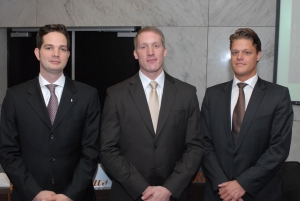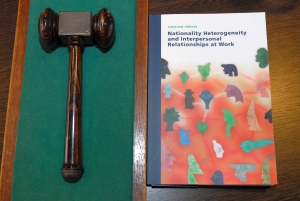Nationality Heterogeneity and Interpersonal Relationships at Work
 Employees often have valuable ideas for improving their organisation, but do not share them with their supervisors. This creates an unfortunate paradox for managers; business is often too complex for ‘figuring it out from the top’ so many managers rely on the input of employees, especially those with different cultural backgrounds with novel ideas for improving business because of their unique experiences and views. Unfortunately, these employees are often in the minority in the workplace, and can be too afraid to speak up.
Employees often have valuable ideas for improving their organisation, but do not share them with their supervisors. This creates an unfortunate paradox for managers; business is often too complex for ‘figuring it out from the top’ so many managers rely on the input of employees, especially those with different cultural backgrounds with novel ideas for improving business because of their unique experiences and views. Unfortunately, these employees are often in the minority in the workplace, and can be too afraid to speak up.
In his dissertation entitled Nationality Heterogeneity and Interpersonal Relationships at Work, Christian Tröster shows that managers need to signal their openness to the ideas of minority employees if they want to reap the benefits of a diverse workforce. Another way organisations can facilitate their diverse employees’ input is through transferring employees from minority backgrounds into positions of leadership. These findings are important because the research also shows that minorities often report they have valuable ideas for improving the organisation, but do not communicate them. Organisations could learn to benefit from their ideas through simple and cheap means.
Christian Tröster defended his dissertation on 13 May 2011 at Rotterdam School of Management, Erasmus University (RSM). His promoter was Prof.dr. D.L. van Knippenberg, Professor of Organizational Behavior at RSM. Other members of the Doctoral Committee were Dr. D. van Dierendonck, Dr. G. Jakobs-Belschak, and Dr. A. Mehra.
About Christian Tröster
Christian Tröster (1980, Germany) studied Sociology at the University of Duisburg-Essen. He was selected for the ERASMUS exchange programme of the European Union for a one-year exchange programme for the study of Sociology at the University of Groningen, the Netherlands. There he also finished his BSc. in Sociology/ Social Consultancy (2005) and one year later his MSc. in Sociology. In 2006 Christian Tröster started his Ph.D. at the Department of Organisation and Personnel at Rotterdam School of Management, Erasmus University. In 2009 he spent three month as visiting scholar at the LINKS Centre at the Gatton College of Business and Economics, University of Kentucky. His research interests include social networks, leadership, and teams. Christian has presented his work at the Academy of Management Meeting, the Society for Industrial and Organizational Psychology Conference, and the European Association of Work and Organizational Psychology Conference. Currently, Christian holds a position as Visiting Assistant Professor of Organizational Behavior at the Lee Kong Chian School of Business, Singapore Management University.
Abstract of Nationality Heterogeneity and Interpersonal Relationships at Work
 In this dissertation Tröster tests three new approaches to extend the ‘classical’ model of workplace diversity. The ‘classical’ model of workplace diversity assumes that diversity affects work outcomes via the mediating effects of social networks. He hypothesises that this model fruitfully can be extended by 1) considering that diversity forms a context in which employees act, 2) testing alternative predictors of network formation and employee behavior (i.e., employee voice), and 3) integrating diversity and social network perspectives in a contingency model. Three empirical studies support these hypotheses. In the first study, Tröster shows that the association between leadership and employee voice is stronger for nationality dissimilar employees. The second study finds that employee voice affects the strength of friendship relations but that this effect is contingent on employees’ past positions in the social network. Finally, the third study demonstrates that group performance is maximised at moderate levels of task network centralisation but lowest at high and low levels of centralisation but that this relation is moderated by nationality diversity. Nationality diverse teams required more centralisation to achieve high performance than homogeneous teams. Finally, he discusses the implications of these findings for research on diversity and social networks.
In this dissertation Tröster tests three new approaches to extend the ‘classical’ model of workplace diversity. The ‘classical’ model of workplace diversity assumes that diversity affects work outcomes via the mediating effects of social networks. He hypothesises that this model fruitfully can be extended by 1) considering that diversity forms a context in which employees act, 2) testing alternative predictors of network formation and employee behavior (i.e., employee voice), and 3) integrating diversity and social network perspectives in a contingency model. Three empirical studies support these hypotheses. In the first study, Tröster shows that the association between leadership and employee voice is stronger for nationality dissimilar employees. The second study finds that employee voice affects the strength of friendship relations but that this effect is contingent on employees’ past positions in the social network. Finally, the third study demonstrates that group performance is maximised at moderate levels of task network centralisation but lowest at high and low levels of centralisation but that this relation is moderated by nationality diversity. Nationality diverse teams required more centralisation to achieve high performance than homogeneous teams. Finally, he discusses the implications of these findings for research on diversity and social networks.
View photos of Christian Tröster's defense
Download 'Nationality Heterogeneity and Interpersonal Relationships at Work' at RePub


